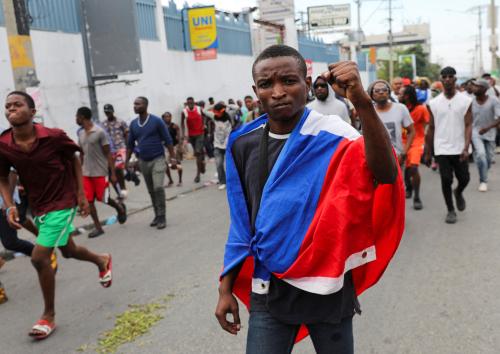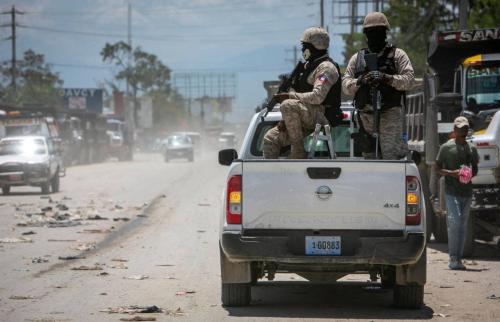On June 25, Haitians in Port-au-Prince watched closely as several hundred Kenyan police officers, clad in uniform, filed to the tarmac from a Kenya Airways plane. The officers’ arrival had been in the works for more than a year and a half, since the former Haitian prime minister, Ariel Henry, requested international support for the Haitian police in the face of a then-unprecedented uprising by gangs in the fall of 2022.
In the subsequent months, Haiti has continued to slide into greater insecurity. The number of homicides in 2023 was more than double compared with the previous year, and kidnappings and sexual violence have spiked. The worsening security situation culminated in an extended period of coordinated and widespread gang violence in March and April of this year, which destroyed and damaged dozens of public buildings, closed the main port and airport for weeks, and displaced around half a million Haitians. Stuck outside Haiti and unable to return to the country, acting Prime Minister Henry submitted his resignation on March 11.
Last week, the newly-appointed prime minister, Gary Conille, told the United Nations Security Council that, with the support of the Kenyan-led mission, his government intends to restore security to Haiti, “house by house, neighborhood by neighborhood.” The deployment faces many challenges, including fierce opposition promised by the gangs and the deteriorated state of the Haitian police, not to mention the Kenyan police’s own problematic human rights record. But even if all goes well, and the intervention is able to help improve security, its success will only be a starting point—a necessary but insufficient condition for Haiti’s recovery at best.
A changed political scene
What remains essential is political progress. The Kenyans have arrived into a changed political environment, following an agreement in March on a political accord for a transition. A transitional presidential council has been established in place of the presidency, which has been vacant since the assassination of President Jovenel Moïse in July 2021. The council named a transitional prime minister, Conille, on May 29 and swore in a transitional government on June 11.
After a somewhat rocky start for the transitional council and transitional government, the situation has quieted in recent days in Port-au-Prince. New governments in Haiti are often given a window of relative calm at the beginning of their terms, but it’s unclear how much of this lull is a result of Haitian society pausing to take stock of the new government, and how much of it is the gangs retrenching, watching, and preparing for potential anti-gang action. The course of action the gangs choose will likely depend on the transitional government’s ability to establish and sustain the Haitian population’s support. The decision of gang leader Jimmy Chérizier, also known as Barbecue, earlier this week to call for dialogue with the government may be a reaction to Haitians’ support for the transitional government’s fledgling efforts to restore normalcy and improve security. But if the transitional government starts to lose this tenuous backing, the gangs will likely feel empowered to more actively confront the government, the police, and the Kenyans.
In any case, Conille, a former senior U.N. official, has a significant task ahead of him. He has already received some praise for his openness and calm hand in establishing the government, but his tenure won’t be easy. In addition to the ordinary challenges of running a government and the extraordinary challenges of bringing Haiti back from the political, economic, and social brink, Conille will also be at the center of the transitional presidential council’s efforts to implement the measures laid out in their foundational political accord. Among other steps, the accord calls for the appointment of additional key bodies, in particular a provisional electoral council to organize elections and a national security council to oversee the relationship with the Kenyan-led mission and help develop a national security strategy.
Moreover, the prime minister’s role has historically been a challenging and contested one, with prime ministers rarely staying for long. In fact, former Prime Minister Henry, upon his resignation in early March, was the longest-serving Haitian prime minister, at two and a half years, since the fall of the Duvalier dictatorship in 1986. Conille also faces the challenge of being what prominent Haitian journalist Frantz Duval has termed “une perle rare”—the international community’s ideal of a diaspora Haitian, a technocrat, swooping in from the outside to fix all that is wrong with the Haitian political system. The problem with these “rare pearls,” however, is that their distance from Haitian political and economic dynamics and lack of connections within Haitian society can doom their governments, especially when they try too quickly to overhaul the system, or when they are unable to identify or address political divisions—like those that have become evident in the presidential transitional council.
A test for Haitian governance
Nevertheless, Haitian transitional governments have shown success in the past in restoring democracy and organizing elections—for example, the transitional government of Ertha Pascal-Trouillot in 1990-91, or of Jocelerme Privert, who successfully organized a rerun of national elections in 2016 without outside financing.
The key to a successful Haitian transition may seem to be divorcing the technical from the political. However, focusing on technical issues like governance reform and electoral preparations will not help address the country’s deeply challenging political dynamics. A technocratic administration can only succeed in the long term if it recognizes that political divisions must be directly addressed in order to develop a common vision and encourage political compromise.
The crucial test will be whether the transitional council and government can maintain Haitian support beyond the short term. There is reason for optimism—at least some small measure of it. The transitional presidential council has been greeted with cautious support from various players in Haitian society. The council has managed to make initial compromises, including on its rules of order. And it is not insignificant that the members of the transitional council have come together to share power, putting together representatives of political groupings that have been at frequent odds over the last three years. But this potential strength could become a weakness as the country approaches elections planned for 2025, when political jockeying will increase, which could exacerbate existing divisions within the council or between the council and Conille’s transitional government.
It will be critical to maintain momentum through the right balance of patience with and pressure on transitional government structures. Under Henry, other political agreements, like the December 21, 2022, accord, seemed initially, at least from the outside, like good faith efforts at progress, but their implementation slowed and stalled relatively quickly. Months and years passed with Henry promising that the appointment of a provisional electoral council and the kick-off of elections were just around the corner. International partners should be ready to remind transitional presidential council members of the promises and the timeline that they committed themselves to. More importantly, they should be ready to condition their support on adherence to this timeline—including a firm commitment to the short-term nature of the multilateral security support mission and its on-time departure at the end of the planned transition period.
At the same time, Haitians must receive the space they need to figure things out themselves. It is quite likely, given past precedent, that the next few months will see disagreements among transitional council members or between the transitional council and the prime minister, or conflicts with various sectors of Haitian society about policy initiatives. It will be critical to distinguish between the type of disagreements that are to be expected and disagreements that threaten the progress of the political process. In the current situation, who makes decisions and how these decisions are made is as important, if not more important, than the decisions themselves. In this regard, the transitional presidential council’s agreement to make all decisions through a supermajority of five of seven voting members is a positive example. The international community should encourage Haitian political actors to find additional ways to expand consensus and develop compromises, for example through the development of political party coalitions, as important initial steps toward changing Haiti’s winner-take-all political culture.
An uncertain road ahead
What’s clear is that recent steps forward, including the Kenyans’ arrival, will not by themselves solve all of Haiti’s challenges. The international community should not assume that it can heave a sigh of relief and focus its attention on other areas of the world.
There will, of course, be issues: the question is only what form they will take, and how effectively Haiti, supported by the Kenyans and other international partners, will respond. How will the Haitian National Police and the Kenyans respond to gang attacks? Will there be Kenyan casualties, and what effect will they have on Kenya’s commitment to the mission? Will Kenyan police officers fire on unarmed protesting civilians, as they did in Nairobi the very same day that the deployment arrived in Haiti? Will the Conille government go a step or two too far, too quickly, in pushing for reform, only to see the gangs resist or the country rise up? A larger concern is that, even if the country returns to levels of stability seen in previous years, the situation may deteriorate further as planned elections approach.
In the meantime, though, many Haitians are hopeful that they might be able to have a chance to breathe, to return home, to live in something better than a state of constant fear. Haitians’ incredible resilience is born of necessity, not choice. They should be given the chance to fully live their lives.
The Brookings Institution is committed to quality, independence, and impact.
We are supported by a diverse array of funders. In line with our values and policies, each Brookings publication represents the sole views of its author(s).





Commentary
Why Kenya’s deployment won’t solve all of Haiti’s problems
July 12, 2024